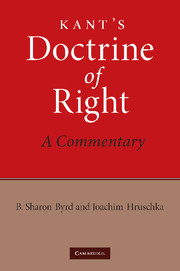Book contents
- Frontmatter
- Contents
- Introduction and methods of interpretation
- Chapter 1 The idea of the juridical state and the postulate of public law
- Chapter 2 The state of nature and the three leges
- Appendix to Chapter 2 Iustitia tutatrix, iustitia commutativa, and iustitia distributiva and their differences
- Chapter 3 The right to freedom
- Chapter 4 The permissive law in the Doctrine of Right
- Chapter 5 The external mine and thine
- Chapter 6 Intelligible possession of land
- Chapter 7 The “state in the idea”
- Chapter 8 The state in reality
- Chapter 9 International and cosmopolitan law
- Chapter 10 The “idea of public law” and its limits
- Chapter 11 Contract law I. Why must I keep my promise?
- Chapter 12 Contract law II. Kant's table of contracts
- Chapter 13 Criminal punishment
- Chapter 14 The human being as a person
- Appendix I to Chapter 14 On the logic of “‘ought’ implies ‘can’”
- Appendix II to Chapter 14 The system of rules of imputation
- Bibliography
- Index
Chapter 8 - The state in reality
Published online by Cambridge University Press: 05 June 2012
- Frontmatter
- Contents
- Introduction and methods of interpretation
- Chapter 1 The idea of the juridical state and the postulate of public law
- Chapter 2 The state of nature and the three leges
- Appendix to Chapter 2 Iustitia tutatrix, iustitia commutativa, and iustitia distributiva and their differences
- Chapter 3 The right to freedom
- Chapter 4 The permissive law in the Doctrine of Right
- Chapter 5 The external mine and thine
- Chapter 6 Intelligible possession of land
- Chapter 7 The “state in the idea”
- Chapter 8 The state in reality
- Chapter 9 International and cosmopolitan law
- Chapter 10 The “idea of public law” and its limits
- Chapter 11 Contract law I. Why must I keep my promise?
- Chapter 12 Contract law II. Kant's table of contracts
- Chapter 13 Criminal punishment
- Chapter 14 The human being as a person
- Appendix I to Chapter 14 On the logic of “‘ought’ implies ‘can’”
- Appendix II to Chapter 14 The system of rules of imputation
- Bibliography
- Index
Summary
Kant's decisive question on public law is: How is a “supreme state power,” a summum imperium, possible? The question is not: How is an actual dominion of humans over humans possible? History shows it is. “States” indistinguishable from dens of thieves, slavery, despotism, concentration camps, confining walls, and the like have existed from time immemorial. Instead Kant's question is: How is a dominion of humans over humans with the character of law possible? The concept of a supreme state power includes an authorization to establish law, meaning the supreme power has the right to establish law, but more importantly the moral capacity (facultas moralis) to do so. Even for a system of “only positive law,” Kant notes, “a natural law must precede which establishes the lawgiver's authority (i.e. the capacity to obligate others through his choice).” The basic question of the law of state is thus: Why do people who call themselves “lawgivers” have the authority to give law? Kant formulates the question as follows: “In every commonwealth there is a summum imperium [supreme power], and therefore also subditi [subjects]. Prior to any real dominion and subjection, however, there must be a right of human beings according to which it [dominion] is originally possible.” The question thus is: How is legal dominion originally possible?
This question of public law aligns with the questions Kant raises regarding private law. For property law Kant asks: How is legal (as opposed to purely factual) dominion over external things possible?
- Type
- Chapter
- Information
- Kant's Doctrine of RightA Commentary, pp. 168 - 187Publisher: Cambridge University PressPrint publication year: 2010



